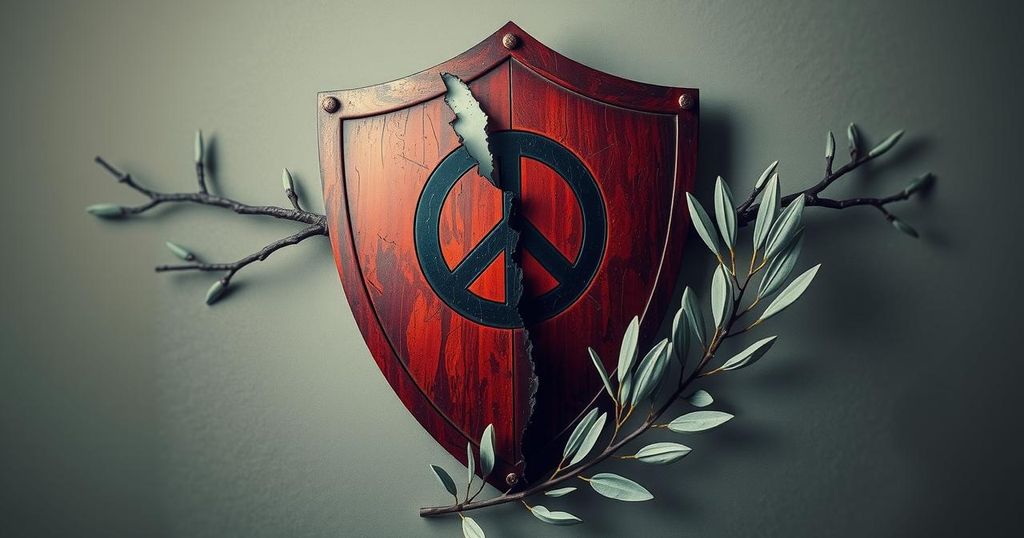The U.N. warns of heightened sexual violence in eastern DRC as conflict escalates between M23 rebels and Congolese troops. Accusations against Rwanda complicate the humanitarian crisis, with over 200 reported cases of sexual violence since violence surged. Health risks for women and children rise amid ongoing instability and widespread displacement throughout the region.
As conflict escalates between M23 rebels and Congolese forces in the eastern Democratic Republic of Congo (DRC), the U.N. Office of the High Commissioner for Human Rights has reported an alarming increase in the use of sexual violence as a weapon of war. Jeremy Laurence, spokesperson for U.N. human rights chief Volker Türk, noted that this form of violence has been a tragic hallmark of armed conflict in eastern DRC for decades. He expressed concern that the recent escalation threatens to exacerbate the already high levels of conflict-related sexual violence.
The ongoing crisis involves the Congolese government and M23 rebels, classified as terrorists by the DRC government while recognized as armed rebels by the U.N. and the U.S. The DRC has accused Rwanda of supporting the M23 group—a claim Rwanda denies—while Kigali alleges collaboration between Kinshasa and the Democratic Forces for the Liberation of Rwanda, a Hutu militia linked to the 1994 Rwandan genocide. This regional dispute complicates an already volatile situation.
Recent fighting has led to significant humanitarian concerns, with military operations resulting in thousands being displaced. Analysts warn that continued instability could deepen the regional conflict, as evidenced by reported casualties among peacekeepers from the Southern African Development Community amidst the ongoing hostilities. Laurence highlighted that the increase in sexual violence incidents coincided with M23’s recent takeover of Goma, the capital of North Kivu, marking a troubling development in the conflict.
The United Nations has documented over 200 reported cases of rape and sexual violence since the crisis erupted, although actual figures may be significantly higher due to underreporting. Tarik Jasarevic of the World Health Organization raised alarms regarding heightened risks for pregnant women, exacerbating existing maternal health crises in the region, along with an ongoing outbreak of diseases such as malaria and cholera.
The circumstances are dire; at least 700 individuals have died and over 2,800 have sustained injuries since Goma’s capture by M23 on Sunday. DRC Foreign Minister Therese Kayikwamba Wagner has accused Rwanda of illegally occupying parts of her country, suggesting it is using the M23 as a proxy for regime change. In contrast, Rwandan officials assert their troops are present solely for territorial protection.
Reports indicate that both Congolese troops and M23 rebels have been implicated in acts of sexual violence. The U.N. human rights office is currently verifying instances of sexual violence perpetrated by various affiliated groups. Bombings have also been reported at sites for internally displaced persons, resulting in civilian casualties and underscoring the escalating brutality of the conflict.
Displacement continues to rise, with more than 300,000 individuals seeking refuge from the fighting in and around Goma. Amy Pope, director general of the International Organization for Migration (IOM), warned that the pre-existing humanitarian crisis in eastern DRC is deteriorating rapidly due to renewed violence, further complicating the aid response in the region.
The conflict has spread southward, with M23 reportedly occupying educational and health facilities, coercing civilians into labor, and compelling the displaced to vacate their camps. Additionally, the proliferation of weapons in Goma significantly heightens the risk of severe human rights violations, heavily impacting civilians who are now urgently requesting protection, as articulated by Volker Türk, who calls for accountability for these ongoing violations.
The ongoing violence in the eastern DRC reflects a long history of conflict exacerbated by political tensions, ethnic rivalries, and external interventions. The use of sexual violence as a weapon of war has been an enduring issue, predominantly affecting women and girls during periods of unrest. The international community, including the U.N., has repeatedly condemned these acts while attempting to address the humanitarian needs arising from the conflict. The situation is further complicated by regional dynamics, particularly involving the DRC’s relationship with Rwanda, amid allegations of support for armed rebel groups.
In summary, the escalation of conflict between M23 rebels and Congolese forces in the DRC has led to increased sexual violence and humanitarian crises. The use of rape as a weapon of war emphasizes the dire conditions faced by civilians, particularly women. Calls for accountability and protection from widespread violence are more urgent than ever as the situation remains precarious and continues to evolve.
Original Source: www.voanews.com




